10 Stocks For Using A Benjamin Graham Value Investing Strategy
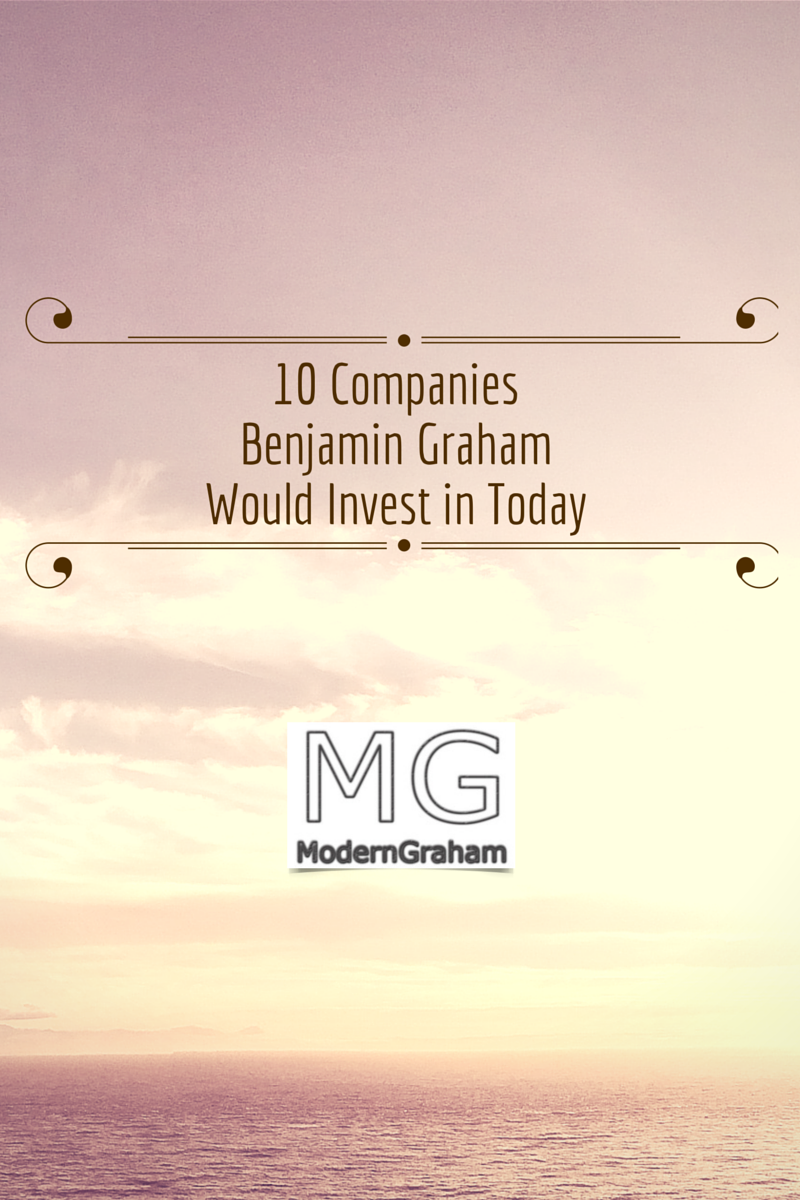
Out of the multitude of companies, which ones would legendary value investor Benjamin Graham buy today? I’ve compiled ten great companies that fit the ModernGraham criteria, based on Benjamin Graham’s methods. The companies in this list pass the rigorous requirements of either the Defensive Investor or the Enterprising Investor and are either fairly valued or undervalued by the market.
Baxter International Inc (BAX)
Baxter International Inc qualifies for both the Defensive Investor and the Enterprising Investor. In fact, the company meets all of the requirements of both investor types, a rare accomplishment indicative of the company’s strong financial position. . The Enterprising Investor has no initial concerns. As a result, all value investors following the ModernGraham approach should feel comfortable proceeding with the analysis.
As for a valuation, the company appears to be Undervalued after growing its EPSmg (normalized earnings) from $3.6 in 2012 to an estimated $5.16 for 2016. This level of demonstrated earnings growth outpaces the market’s implied estimate of 0.31% annual earnings growth over the next 7-10 years. As a result, the ModernGraham valuation model, based on the Benjamin Graham value investing formula, returns an estimate of intrinsic value above the price.
At the time of valuation, further research into Baxter International Inc revealed the company was trading below its Graham Number of $56.96. The company pays a dividend of $0.49 per share, for a yield of 1% Its PEmg (price over earnings per share – ModernGraham) was 9.12, which was below the industry average of 32.29, which by some methods of valuation makes it one of the most undervalued stocks in its industry. Finally, the company was trading above its Net Current Asset Value (NCAV) of $-0.96. (See the full valuation)
(Click on image to enlarge)
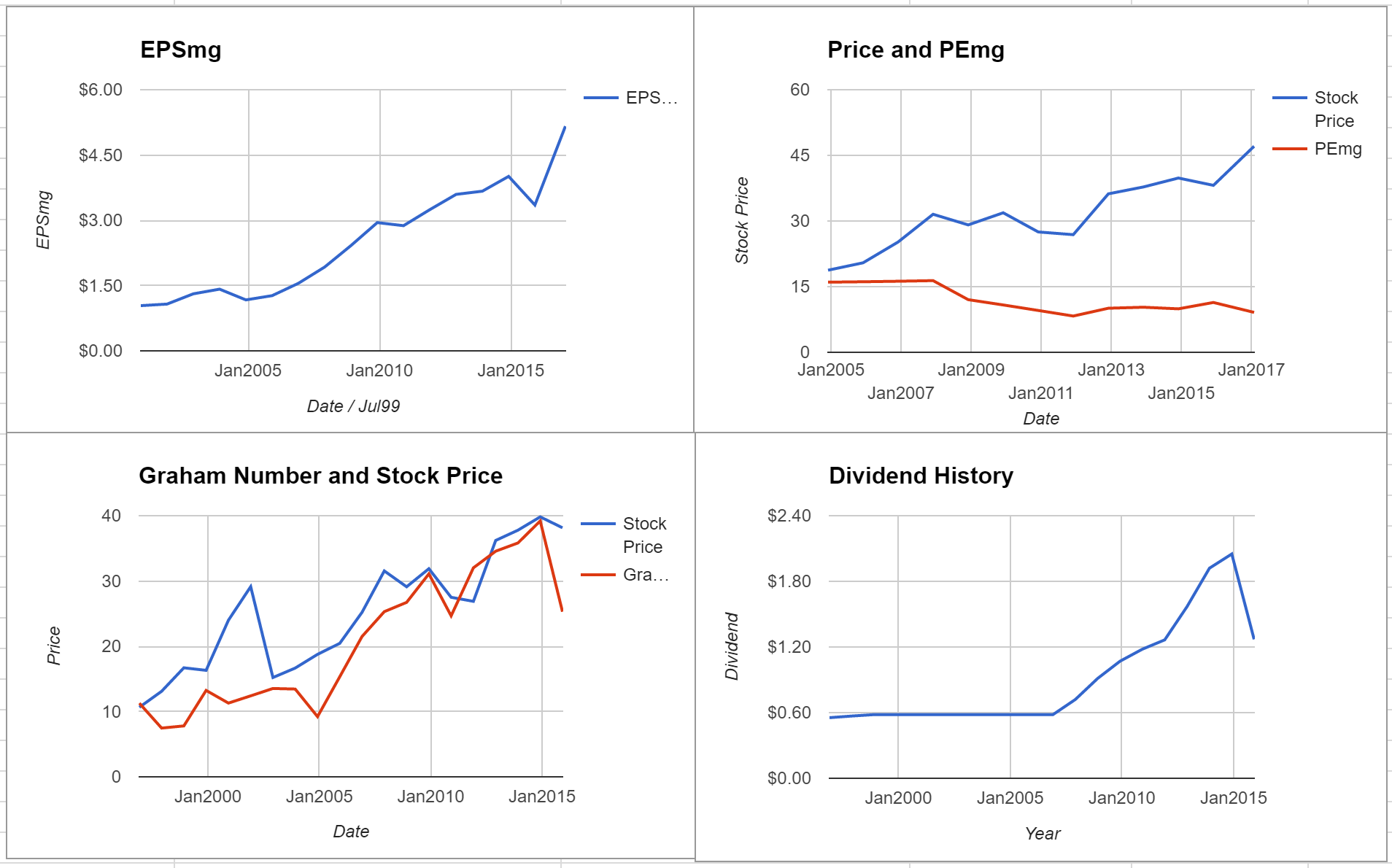
Canadian Imperial Bank of Commerce (TSE:CM)
Canadian Imperial Bank of Commerce is suitable for the Enterprising Investor but not the more conservative Defensive Investor. The Defensive Investor is concerned with the insufficient earnings stability over the last ten years. The Enterprising Investor has no initial concerns. As a result, all Enterprising Investors following the ModernGraham approach should feel comfortable proceeding with the analysis.
As for a valuation, the company appears to be Undervalued after growing its EPSmg (normalized earnings) from $7.07 in 2013 to an estimated $9.62 for 2017. This level of demonstrated earnings growth outpaces the market’s implied estimate of 1.5% annual earnings growth over the next 7-10 years. As a result, the ModernGraham valuation model, based on Benjamin Graham’s formula, returns an estimate of intrinsic value above the price.
At the time of valuation, further research into Canadian Imperial Bank of Commerce revealed the company was trading below its Graham Number of $114.08. The company pays a dividend of $4.75 per share, for a yield of 4.3%, putting it among the best dividend paying stocks today. Its PEmg (price over earnings per share – ModernGraham) was 11.5, which was below the industry average of 21.43, which by some methods of valuation makes it one of the most undervalued stocks in its industry. (See the full valuation)
(Click on image to enlarge)
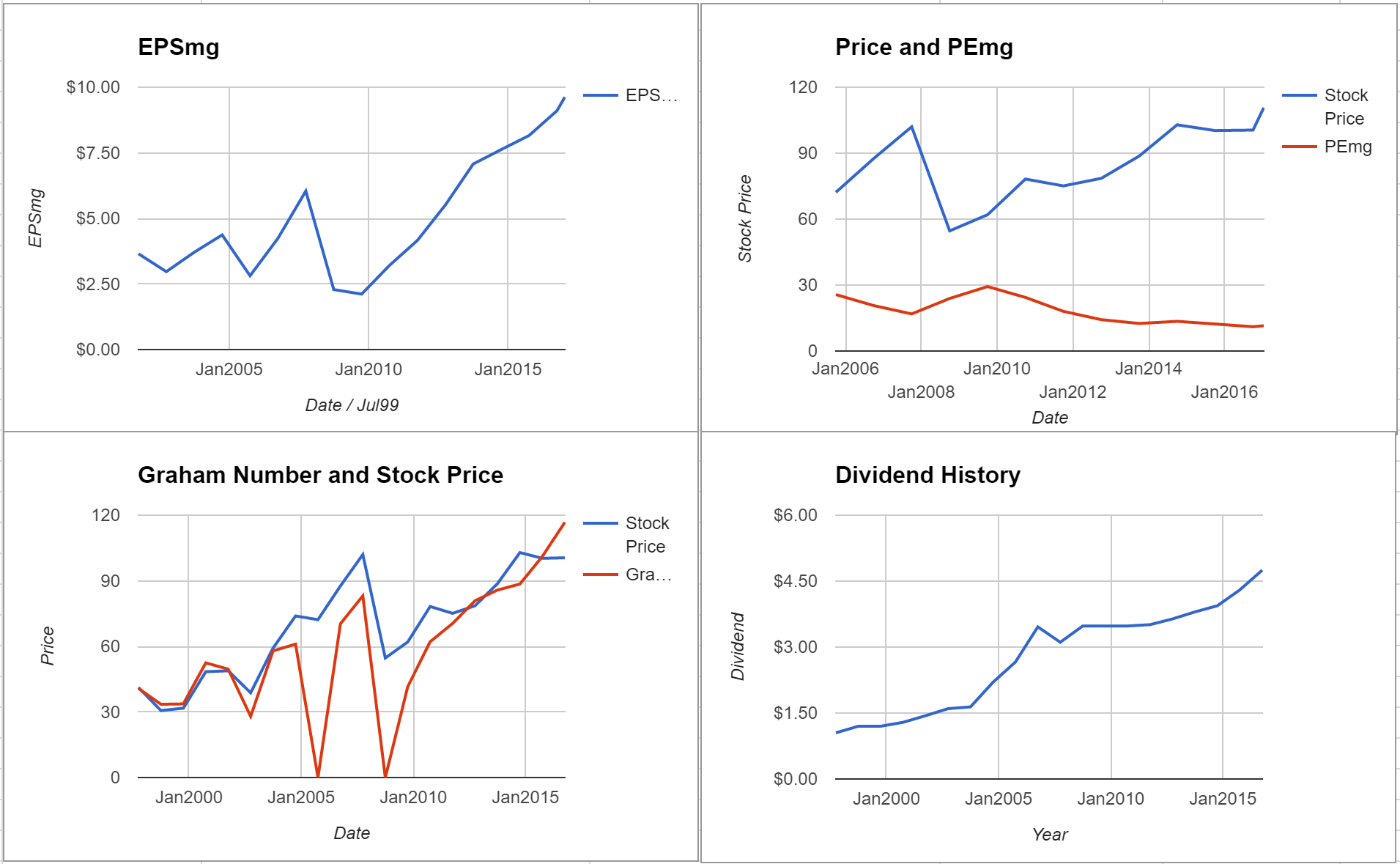
Chesapeake Lodging Trust (CHSP)
Chesapeake Lodging Trust is suitable for the Enterprising Investor but not the more conservative Defensive Investor. The Defensive Investor is concerned with the small size, insufficient earnings stability over the last ten years, the poor dividend history, and the high PEmg ratio. The Enterprising Investor is only concerned with the level of debt relative to the net current assets. As a result, all Enterprising Investors following the ModernGraham approach should feel comfortable proceeding with the analysis.
As for a valuation, the company appears to be Undervalued after growing its EPSmg (normalized earnings) from $0.29 in 2012 to an estimated $0.98 for 2016. This level of demonstrated earnings growth outpaces the market’s implied estimate of 9.4% annual earnings growth over the next 7-10 years. As a result, the ModernGraham valuation model, based on the Benjamin Graham value investing formula, returns an estimate of intrinsic value above the price.
At the time of valuation, further research into Chesapeake Lodging Trust revealed the company was trading above its Graham Number of $22.35. The company pays a dividend of $1.6 per share, for a yield of 6%, putting it among the best dividend paying stocks today. Its PEmg (price over earnings per share – ModernGraham) was 27.29, which was below the industry average of 31.91, which by some methods of valuation makes it one of the most undervalued stocks in its industry. Finally, the company was trading above its Net Current Asset Value (NCAV) of $-12.24. (See the full valuation)
(Click on image to enlarge)

Citigroup Inc (C)
Citigroup Inc is suitable for the Enterprising Investor but not the more conservative Defensive Investor. The Defensive Investor is concerned with the insufficient earnings stability or growth over the last ten years, and the poor dividend history. The Enterprising Investor has no initial concerns. As a result, all Enterprising Investors following the ModernGraham approach should feel comfortable proceeding with the analysis.
As for a valuation, the company appears to be Undervalued after growing its EPSmg (normalized earnings) from $-2.31 in 2012 to an estimated $4.1 for 2016. This level of demonstrated earnings growth outpaces the market’s implied estimate of 1.16% annual earnings growth over the next 7-10 years. As a result, the ModernGraham valuation model, based on Benjamin Graham’s formula, returns an estimate of intrinsic value above the price. (See the full valuation)
(Click on image to enlarge)
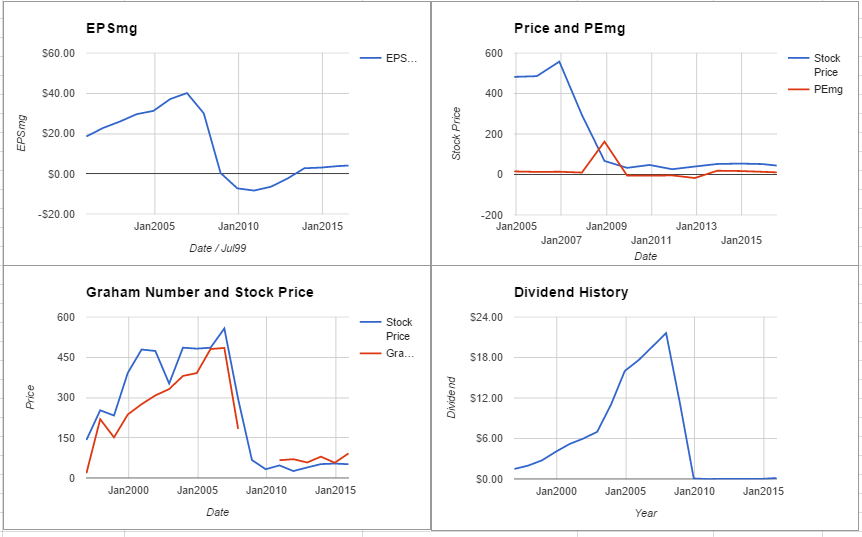
Equity Residential (EQR)
Equity Residential qualifies for both the Defensive Investor and the Enterprising Investor. The Defensive Investor is only initially concerned with the low current ratio. The Enterprising Investor has concerns regarding the level of debt relative to the current assets. As a result, all value investors following the ModernGraham approach should feel comfortable proceeding with the analysis.
As for a valuation, the company appears to be Undervalued after growing its EPSmg (normalized earnings) from $2.15 in 2012 to an estimated $5.79 for 2016. This level of demonstrated earnings growth outpaces the market’s implied estimate of 1.39% annual earnings growth over the next 7-10 years. As a result, the ModernGraham valuation model, based on the Benjamin Graham value investing formula, returns an estimate of intrinsic value above the price.
At the time of valuation, further research into Equity Residential revealed the company was trading below its Graham Number of $90.07. The company pays a dividend of $2.11 per share, for a yield of 3.2%, putting it among the best dividend paying stocks today. Its PEmg (price over earnings per share – ModernGraham) was 11.29, which was below the industry average of 34.03, which by some methods of valuation makes it one of the most undervalued stocks in its industry. Finally, the company was trading above its Net Current Asset Value (NCAV) of $-24.85. (See the full valuation)
(Click on image to enlarge)

KB Home (KBH)
KB Home is suitable for the Enterprising Investor but not the more conservative Defensive Investor. The Defensive Investor is concerned with the small size, insufficient earnings stability or growth over the last ten years. The Enterprising Investor has no initial concerns. As a result, all Enterprising Investors following the ModernGraham approach should feel comfortable proceeding with the analysis.
As for a valuation, the company appears to be Undervalued after growing its EPSmg (normalized earnings) from $-0.72 in 2013 to an estimated $2.2 for 2017. This level of demonstrated earnings growth outpaces the market’s implied estimate of 0.52% annual earnings loss over the next 7-10 years. As a result, the ModernGraham valuation model, based on the Benjamin Graham value investing formula, returns an estimate of intrinsic value above the price.
At the time of valuation, further research into KB Home revealed the company was trading below its Graham Number of $25.21. The company pays a dividend of $0.1 per share, for a yield of 0.6% Its PEmg (price over earnings per share – ModernGraham) was 7.47, which was below the industry average of 28.49, which by some methods of valuation makes it one of the most undervalued stocks in its industry. Finally, the company was trading above its Net Current Asset Value (NCAV) of $8.5. (See the full valuation)
(Click on image to enlarge)
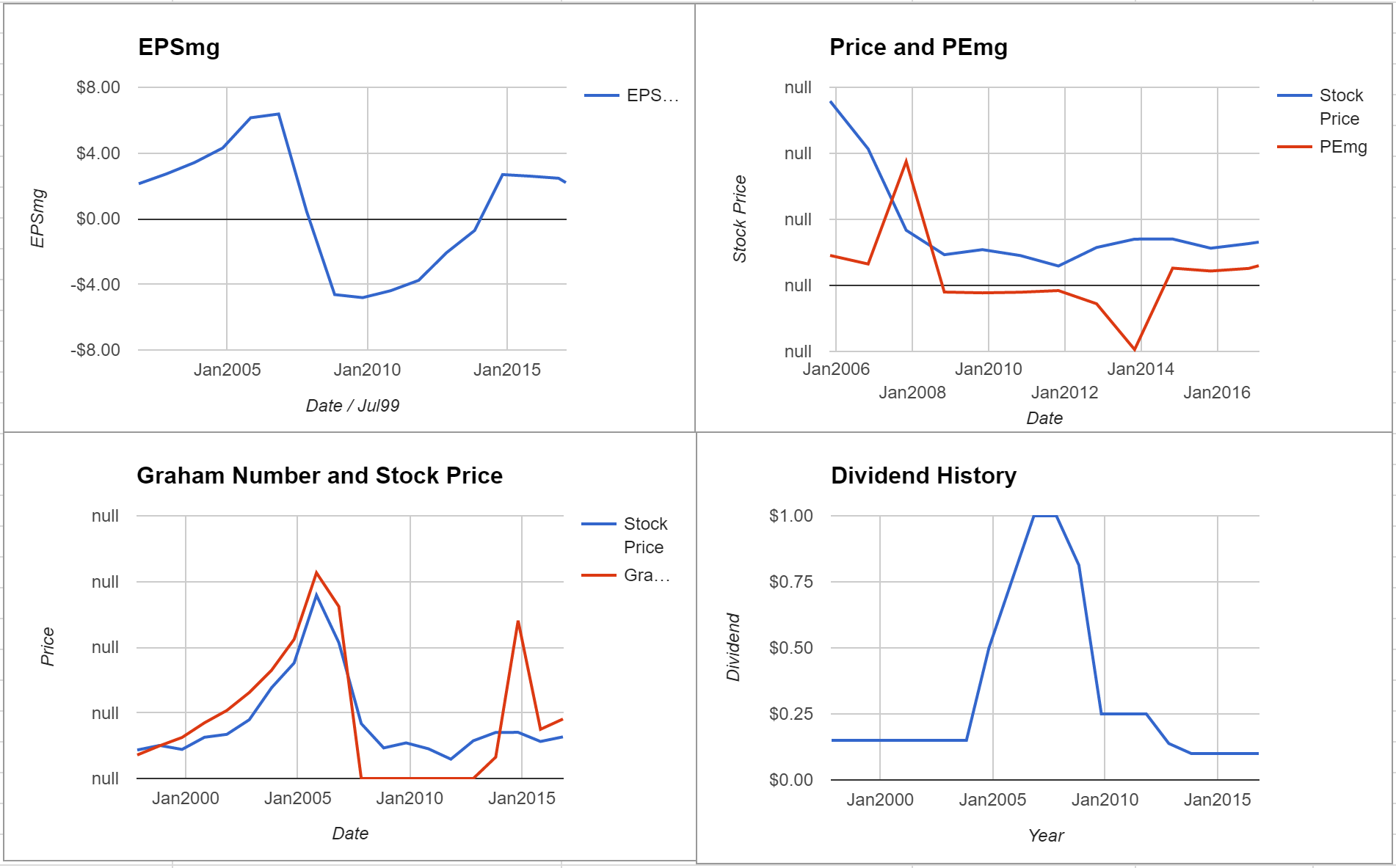
Metlife Inc (MET)
Metlife Inc is suitable for the Enterprising Investor but not the more conservative Defensive Investor. The Defensive Investor is concerned with the insufficient earnings stability over the last ten years. The Enterprising Investor has no initial concerns. As a result, all Enterprising Investors following the ModernGraham approach should feel comfortable proceeding with the analysis.
As for a valuation, the company appears to be Undervalued after growing its EPSmg (normalized earnings) from $2.37 in 2012 to an estimated $4.04 for 2016. This level of demonstrated earnings growth outpaces the market’s implied estimate of 2.75% annual earnings growth over the next 7-10 years. As a result, the ModernGraham valuation model, based on Benjamin Graham’s formula, returns an estimate of intrinsic value above the price.
At the time of valuation, further research into Metlife Inc revealed the company was trading below its Graham Number of $78.35. The company pays a dividend of $1.55 per share, for a yield of 2.7%, putting it among the best dividend paying stocks today. Its PEmg (price over earnings per share – ModernGraham) was 14.01, which was below the industry average of 16.56, which by some methods of valuation makes it one of the most undervalued stocks in its industry. (See the full valuation)
(Click on image to enlarge)
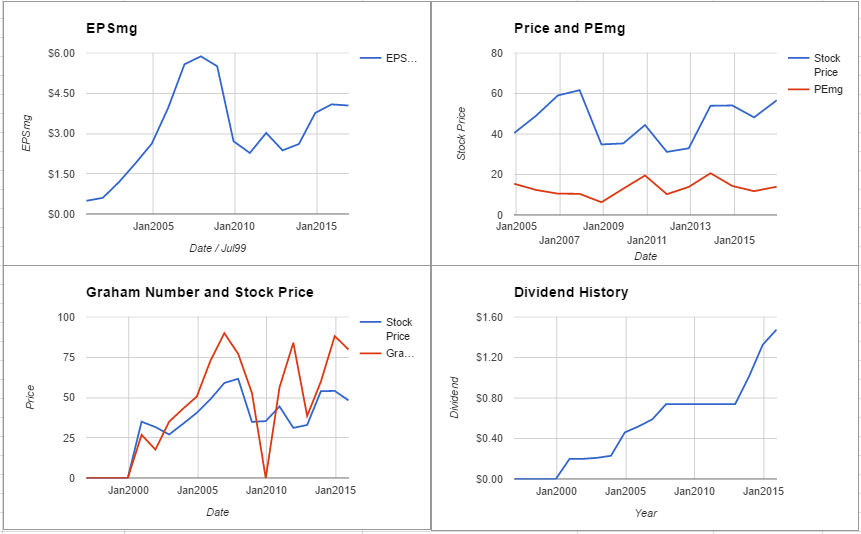
Navient Corp (NAVI)
Navient Corp is suitable for the Enterprising Investor but not the more conservative Defensive Investor. The Defensive Investor is concerned with the insufficient earnings stability over the last ten years, and the poor dividend history. The Enterprising Investor has no initial concerns. As a result, all Enterprising Investors following the ModernGraham approach should feel comfortable proceeding with the analysis.
As for a valuation, the company appears to be Undervalued after growing its EPSmg (normalized earnings) from $0.63 in 2012 to an estimated $2.39 for 2016. This level of demonstrated earnings growth outpaces the market’s implied estimate of 1.25% annual earnings loss over the next 7-10 years. As a result, the ModernGraham valuation model, based on Benjamin Graham’s formula, returns an estimate of intrinsic value above the price.
At the time of valuation, further research into Navient Corp revealed the company was trading below its Graham Number of $21.98. The company pays a dividend of $0.64 per share, for a yield of 4.5%, putting it among the best dividend paying stocks today. Its PEmg (price over earnings per share – ModernGraham) was 6.01, which was below the industry average of 19.87, which by some methods of valuation makes it one of the most undervalued stocks in its industry. (See the full valuation)
(Click on image to enlarge)
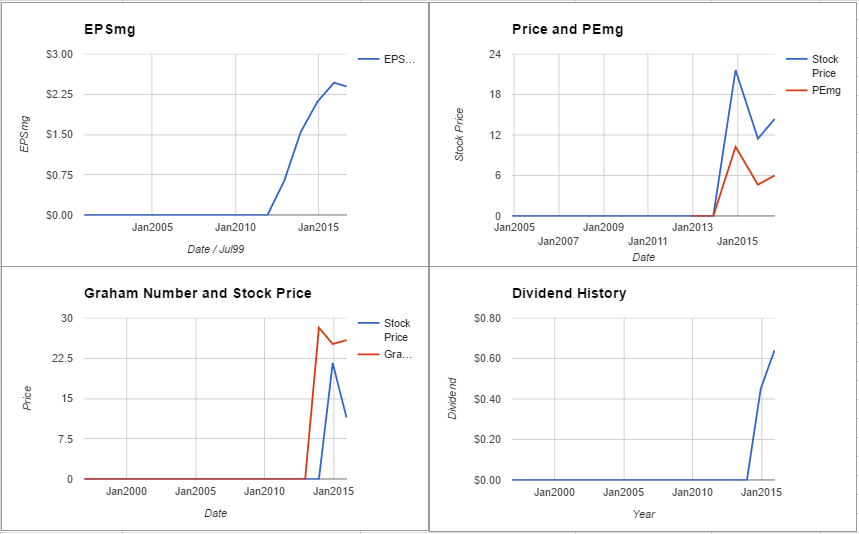
Seneca Foods Corp (SENEA)
Seneca Foods Corp is suitable for the Enterprising Investor but not the more conservative Defensive Investor. The Defensive Investor is concerned with the small size, poor dividend history. The Enterprising Investor is only concerned with the lack of dividends. As a result, all Enterprising Investors following the ModernGraham approach should feel comfortable proceeding with the analysis.
As for a valuation, the company appears to be Undervalued after growing its EPSmg (normalized earnings) from $1.73 in 2012 to an estimated $2.72 for 2016. This level of demonstrated earnings growth outpaces the market’s implied estimate of 3.19% annual earnings growth over the next 7-10 years. As a result, the ModernGraham valuation model, based on the Benjamin Graham value investing formula, returns an estimate of intrinsic value above the price.
At the time of valuation, further research into Seneca Foods Corp revealed the company was trading below its Graham Number of $69.2. The company does not pay a dividend. Its PEmg (price over earnings per share – ModernGraham) was 14.87, which was below the industry average of 24.74, which by some methods of valuation makes it one of the most undervalued stocks in its industry. Finally, the company was trading above its Net Current Asset Value (NCAV) of $16.89. (See the full valuation)
(Click on image to enlarge)

Signet Jewelers Ltd. (SIG)
Signet Jewelers Ltd. is suitable for the Enterprising Investor but not the more conservative Defensive Investor. The Defensive Investor is concerned with the insufficient earnings stability or growth over the last ten years, and the poor dividend history. The Enterprising Investor has no initial concerns. As a result, all Enterprising Investors following the ModernGraham approach should feel comfortable proceeding with the analysis.
As for a valuation, the company appears to be Undervalued after growing its EPSmg (normalized earnings) from $2.84 in 2013 to an estimated $5.77 for 2017. This level of demonstrated earnings growth outpaces the market’s implied estimate of 3.39% annual earnings growth over the next 7-10 years. As a result, the ModernGraham valuation model, based on the Benjamin Graham value investing formula, returns an estimate of intrinsic value above the price.
At the time of valuation, further research into Signet Jewelers Ltd. revealed the company was trading above its Graham Number of $71.41. The company pays a dividend of $1 per share, for a yield of 1.1% Its PEmg (price over earnings per share – ModernGraham) was 15.29, which was below the industry average of 26.36, which by some methods of valuation makes it one of the most undervalued stocks in its industry. Finally, the company was trading above its Net Current Asset Value (NCAV) of $4.06. (See the full valuation)
Disclaimer: The author did not hold a position in any company mentioned in this article at ...
more



Thanks for sharing